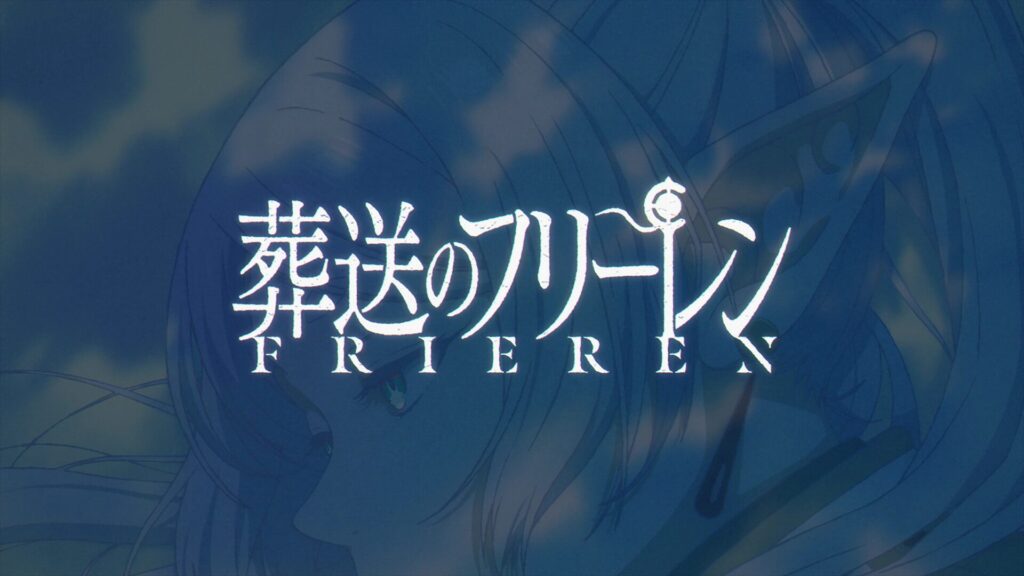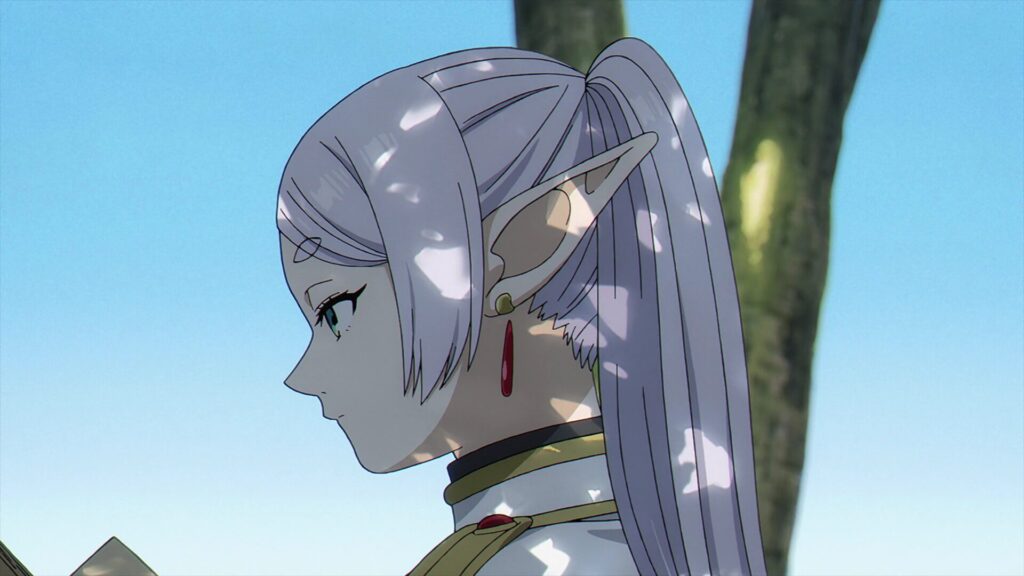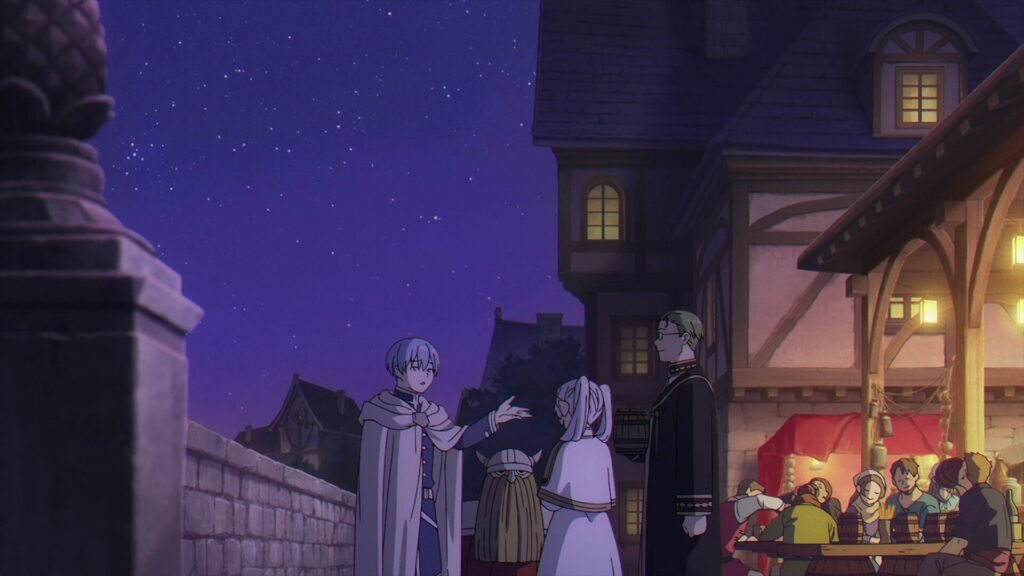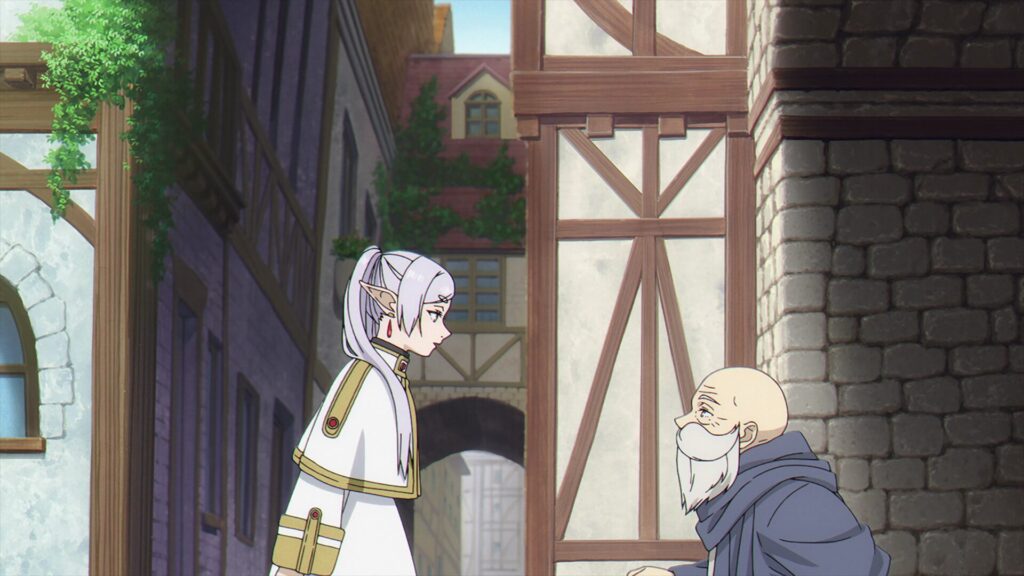
あらすじ:英語で読む別れと時間、記憶の物語
The legendary hero party /
伝説の勇者パーティーは /
defeated the Demon King, /
魔王を倒し /
bringing peace to the world. /
世界に平和をもたらした。 /
After their long journey ended, /
長い旅の終わりに /
the elven mage Frieren /
エルフの魔法使いフリーレンは /
parted ways with her companions. /
仲間たちと別れた。 /
For her, /
彼女にとっては /
a decade spent with humans /
人間たちと過ごした10年は /
felt like only a brief moment. /
ほんの一瞬のようだった。 /
Fifty years later, /
50年後、 /
she visits an aging Heiter /
老いたハイターを訪れた彼女は /
and meets his apprentice, Fern. /
弟子のフェルンに出会う。 /
As time passes, /
時が流れるにつれて /
the concept of farewell /
別れという概念は /
begins to change meaning for Frieren. /
フリーレンにとって意味を変えていく。 /
She starts a new journey /
彼女は新たな旅に出る /
to understand emotions /
かつて無視していた /
she once ignored. /
感情を理解するために。 /
This is the beginning /
これは始まりである /
of a slow, emotional tale /
ゆっくりとした感情の物語の /
about memory, time, and connection. /
記憶と時間、つながりを描く。 /
💡 語彙解説
- legendary /ˈledʒəndɛri/(形容詞):伝説的な
→ 「すごく有名で語り継がれるような」という意味で使われます。 - defeat /dɪˈfiːt/(動詞):倒す、打ち負かす
→ 試合や戦いで「勝つ」ことを表す基本動詞です。 - part ways with /pɑːrt weɪz wɪð/(表現):〜と別れる
→ 直訳は「道を分かつ」で、物理的にも心理的にも別れるときに使われます。 - farewell /ˌferˈwel/(名詞):別れ、送別
→ フォーマルな「さようなら」の意味でも使われます。 - connection /kəˈnɛkʃən/(名詞):つながり、関係
→ 人との心のつながりや意味のある関係を指すときによく使われます
セリフ1:魔王を倒しても終わりじゃない ― フリーレンの旅が始まる

魔王を倒したからといって終わりじゃない。この先の人生の方が長いんだ。
Slaying the Demon King was one chapter, but read on, for we’ve stories yet to tell and lives yet to live.
💡 語彙解説
- slay /sleɪ/(動詞):(文語)殺す、討つ
→ 過去形は「slew」、ファンタジー作品でよく使われます。 - chapter /ˈtʃæptər/(名詞):章、区切り
→ 「人生の一章」というように、比喩的にも使われます。 - read on /riːd ɒn/(句動詞):読み進める
→ 「話の続きを読みなさい」という命令の形で使われます。 - yet to /jet tuː/(表現):まだ〜していない
→ 「これから〜する予定」といった前向きな意味を持ちます。 - tale /teɪl/(名詞):物語、語り
→ story よりも感情や詩的な雰囲気がある言葉です。
🧠 文法・構文解説
Slaying the Demon King was one chapter
→ 「Slaying」は動名詞で文全体の主語になっており、「魔王を倒すことは1章だった」という意味。one chapter は比喩的に「物語の一区切り」を表す。
but read on
→ 接続詞 but で前文と逆接のつながり。read on は句動詞で「その先を読み進める」という命令文の形。
for we’ve stories yet to tell and lives yet to live
→ for は接続詞で「なぜなら」。we’ve は we have の短縮形で「持っている」の意味(現在完了ではない)。stories yet to tell は「まだ語られていない物語」、lives yet to live は「まだ生きるべき人生たち」と訳せる。どちらも yet to + 動詞 の形容詞的用法で、名詞を修飾している。
📘 スラッシュリーディング訳
Slaying the Demon King /
魔王を倒したことは /
was one chapter, /
一章にすぎない /
but read on, /
でも物語は続く /
for we’ve stories yet to tell /
まだ語るべき物語があり /
and lives yet to live. /
セリフ2:フリーレンに託される時間 ― 長命のエルフが背負う未来

フリーレン、君のこの先の人生は僕たちには想像もできないほど長いものになるんだろうね。
Frieren, the life that lies ahead of you will be far longer than the rest of us could know or that we could begin to comprehend.
💡 語彙解説
- lie ahead /laɪ əˈhɛd/(句動詞):先にある、これから起こる
→ 「ahead」は「前に」、lie は「ある・存在する」の意味です。 - comprehend /ˌkɒmprɪˈhɛnd/(動詞):理解する、把握する
→ understand より少し硬めで深い理解を示します。 - far longer than /fɑː ˈlɒŋɡər ðæn/(構文):〜よりずっと長い
→ 比較表現で、「ずっと〜」を表します。
🧠 文法・構文解説
Frieren, the life that lies ahead of you
→ 主語は the life、その後に関係詞節 that lies ahead of you が続き、「君の前に広がる人生」という意味を形成している。lie ahead は「(未来に)待ち受けている」という熟語。
will be far longer
→ will be は未来形で、「~になるだろう」と予測を表す。far longer は比較級で「はるかに長い」を意味し、程度の強さを強調している。
than the rest of us could know or that we could begin to comprehend
→ 比較構文の than 以下に接続詞 that で導かれる2つの節(that we could know / that we could begin to comprehend)が並列され、「僕たちが知り得ることも、理解し始めることすらもできないほど」と訳せる。どちらも仮定法過去で「現実には不可能だが、もしできたとしても」というニュアンスを含む。
📘 スラッシュリーディング訳
Frieren, /
フリーレン、 /
the life that lies ahead of you /
君のこれからの人生は /
will be far longer than /
ずっと長いでしょう /
the rest of us could know /
私たちが知ることのできる範囲よりも /
or that we could begin to comprehend. /
あるいは私たちが想像すらできないほどに。
セリフ3:冒険の重み ― 10年の旅に込められた想い

僕は君たちと冒険ができてよかった。そうですね。短い間だったけどね。短い? 何を言ってるんだ、10年だぞ。
You made this quest the journey of my lifetime. Thank you, all.
I feel the same way.
Our adventure was a mere ten years.
A mere ten? But that’s a full decade spent on one job.
💡 語彙解説
- quest /kwest/(名詞):冒険、探求の旅
→ ファンタジーやRPGでよく使われる「冒険の旅」を指す単語です。 - journey of my lifetime /ˈdʒɜːrni əv maɪ ˈlaɪftaɪm/(表現):人生で最高の旅
→ 一生に一度の、最も印象深い旅という意味になります。 - mere /mɪər/(形容詞):たった〜、わずか〜
→ 数や期間を少なく感じさせる語。皮肉や驚きを伴うことも。 - decade /ˈdɛkeɪd/(名詞):10年間
→ 「10年」という期間を表す基本単語。
🧠 文法・構文解説
You made this quest the journey of my lifetime
→ 第五文型(SVOC)で、make A B は「AをBにする」という構文。the journey of my lifetime は「人生最高の旅」という意味の定番表現。
Thank you, all
→ 呼びかけを含む感謝の表現で、all は「みんな」を指すカジュアルな言い方。
I feel the same way
→ feel + the same way は「同じように感じている」というイディオム。TOEICでも頻出の共感表現。
Our adventure was a mere ten years
→ a mere + 数詞 は「たった〜」という控えめな表現で、逆に長さを強調する効果もある。was は過去形の単純叙述。
A mere ten?
→ 短縮・省略表現で Was it only ten years? の省略形に近い。驚きを表す会話表現。
But that’s a full decade spent on one job
→ a full decade は「まるまる10年」という強調。spent on one job は過去分詞の後置修飾で、「1つの仕事に費やされた」となる。構文的には a decade (that was) spent on one job の省略。
📘 スラッシュリーディング訳
You made this quest /
君はこの冒険を /
the journey of my lifetime.
私の人生で最高の旅にしてくれた。
Thank you, all. /
ありがとう、みんな。
I feel the same way. /
私も同じ気持ちだよ。
Our adventure /
僕たちの冒険は /
was a mere ten years.
たった10年だった。
A mere ten? /
たった10年だって? /
But that’s a full decade /
でもそれは10年もある /
spent on one job.
1つの冒険に費やした年月だよ。
セリフ4:静かな感動のやり取り ― フリーレンとヒンメルの空の会話

綺麗だなぁ。街中だと見えにくいね。人が感動しているんだ。空気を読みたまえ。じゃあ次、50年後もっと綺麗に見える場所知ってるから案内するよ。
Beautiful.
The view from inside the city isn’t very good.
I’m trying to have a moment here.
Don’t spoil the mood.
Next time, then. I know a good place. I’ll take us there when the opportunity arises in 50 years.
💡 語彙解説
- have a moment /hæv ə ˈmoʊmənt/(表現):感動している、しんみりしている
→ 特別な気持ちに浸っている状態を表します。 - spoil the mood /spɔɪl ðə muːd/(表現):雰囲気を壊す
→ 楽しい、感動的な気分を壊すという意味。 - opportunity arises /ˌɒpərˈtjuːnəti əˈraɪzɪz/(表現):機会が訪れる
→ arise は「生じる、起こる」の意味。
🧠 文法・構文解説
The view from inside the city isn’t very good
“from inside the city” は前置詞句で “the view” を修飾し、「街の中からの眺め」という意味になる。
I’m trying to have a moment here
“try to ~” は「~しようとする」。”have a moment” は「感動の瞬間を過ごしている」という口語表現。
Don’t spoil the mood
“spoil the mood” は定型表現で「雰囲気を台無しにする」。命令文として使われている。
I know a good place
“know” の目的語に “a good place” がある第3文型(SVO)。この後の文でその内容が展開される。
I’ll take us there when the opportunity arises in 50 years
“take us there” は「連れて行く」、”when the opportunity arises” は「機会が来たときに」の副詞節。”in 50 years” は未来を示す時表現。
📘 スラッシュリーディング訳
Beautiful. /
綺麗だなぁ。
The view from inside the city isn’t very good. /
街中だと見えにくいね。
I’m trying to have a moment here. /
人が感動しているんだ。
Don’t spoil the mood. /
空気を読みたまえ。
Next time, then. /
じゃあ次、
I know a good place. /
もっと綺麗に見える場所知ってるよ。
I’ll take us there /
案内するよ。
when the opportunity arises in 50 years.
50年後、機会があればね。
セリフ5:再会の静かな驚き ― 変わらない姿と過ぎた年月

老いぼれてる。言い方ひどくない?歳をとった僕もなかなかイケメンだろ。50年ぶりだね。君は昔の姿のままだ。もう一生会えないのかと思っていたよ。
You’re near ancient.
Must you be so blunt?
Considering my advanced age, I’m still quite handsome, yes?
Hard to believe it’s been so long when you show up looking the same as the day we met.
I’d convinced myself I would never see you again.
💡 語彙解説
- ancient /ˈeɪnʃənt/(形容詞):とても年老いた、古代の
→ ここでは冗談っぽく「おじいちゃんレベル」の意味で使われています。 - blunt /blʌnt/(形容詞):ぶっきらぼうな、率直な
→ 遠慮のない言い方を表す。やや否定的に使われることが多い。 - advanced age /ədˈvɑːnst eɪdʒ/(名詞):高齢、かなりの年齢
→ 礼儀正しく年齢を表現する丁寧な言い方。
🧠 文法・構文解説
You’re near ancient
“near ancient” は「ほぼ古代レベル」=「めちゃくちゃ年寄り」という誇張表現。”near” は形容詞的に「~に近い」。
Must you be so blunt?
“Must you ~?” は相手の行動を非難・驚きとともに尋ねる丁寧な反語表現。”blunt” は「ぶっきらぼうな」。
Considering my advanced age, I’m still quite handsome, yes?
“Considering ~” は分詞構文で「~を考慮すれば」。後半は付加疑問の形で、自分を褒めて同意を求めている。
Hard to believe it’s been so long when you show up looking the same as the day we met
“Hard to believe” は「信じがたい」の主語なし構文。”when以下” は理由を含む時間の副詞節で、見た目が変わらないことが信じがたい理由を説明している。
I’d convinced myself I would never see you again
“I’d convinced myself” は過去完了(had convinced)で「そう思い込んでいた」。”I would never see you again” は仮定・未来への諦めの意味を含む。
📘 スラッシュリーディング訳
You’re near ancient. /
老いぼれてる。
Must you be so blunt? /
言い方ひどくない?
Considering my advanced age, /
歳をとった僕としては /
I’m still quite handsome, yes?
まだなかなかイケてるだろ?
Hard to believe it’s been so long /
そんなに長い時が経ったとは信じがたいけど /
when you show up looking the same /
君が現れてみると、昔のままだ。
as the day we met.
初めて会った日の姿そのままだよ。
I’d convinced myself /
僕は思い込んでいたんだ /
I would never see you again.
もう一生会えないんじゃないかって。


